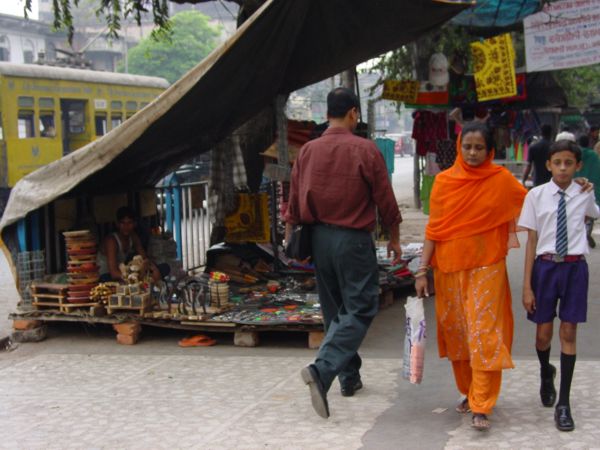 |
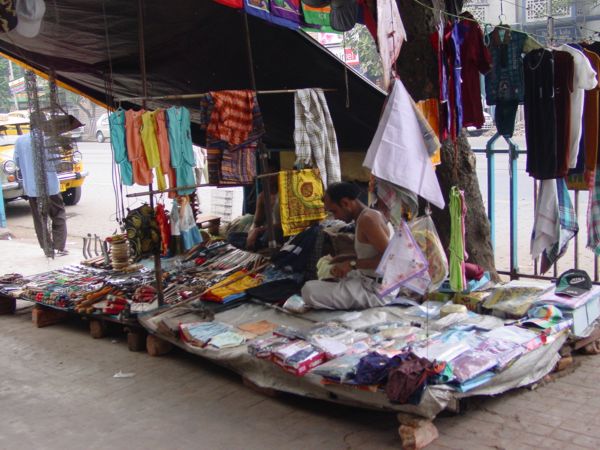 |
|||||
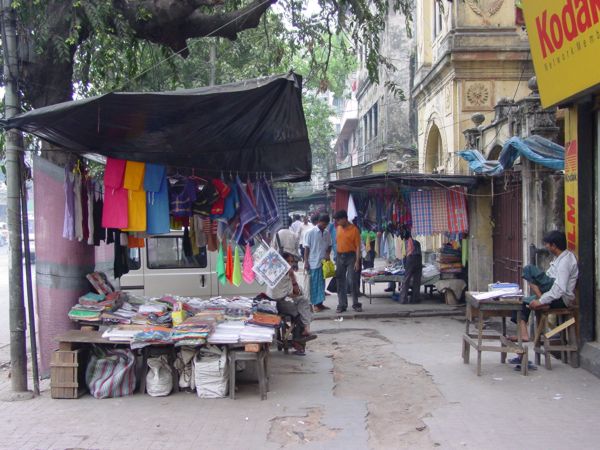 |
||||||
|
In front of Royal Garden Hotel
|
||||||
Cheek by Jowl, March, 15, 2006
Bollywood movies are a real hoot, not five minutes go by without somebody bursting into song. A few minutes later everybody is dancing, suggestively, but never with a kiss. Seductively, with wild choreography, western style or Indian, rural or citified, always noisily, on and on and on. On a mountain top, in a field, in a palace, in a village, in a stream, in the rigging of a ship, in a harem, in the desert, in the jungle. Dance, sing, dance, sing, dance some more.
If you've ever seen a Bollywood movie, you may be surprised that Indian cities are entirely without dancing in their streets--as a matter of fact nobody ever seems even to smile.
 |
 |
|||||
 |
||||||
|
In front of Royal Garden Hotel
|
||||||
Kolkata is the most no-dancing-in-the-streets city we know. It's full of moldering buildings in crumbling neighborhoods where rickety wooden buses, swaying trams, rattling taxis, run-down rickshaws, wobbly two-wheeled carts, and creaking bicycles fill the streets, competing for space and cutting it incredibly close! Traffic appears to be total chaos, and near misses common. Closer observation, however, indicates that drivers drive with their ears and their horns. Indian trucks are lavishly decorated, sometimes with slogans, such as "My India is great," but invariably with a hand lettered notice on the back--"Sound horn please!" A well-timed honk averts tragedy. A deaf driver would be a disaster. Taxi drivers holler at each other, defending their territory, out of pride, exuberance, and general irritability. The horn sounded in a timely way keeps traffic flowing. Of course, none of this is new. About the only change we have detected in Kolkata is that nowadays all the taxis cut their engines at every light or delay, which creates the only moments of relative quiet on the streets. In Kolkata, where people live cheek by jowl by jowl by cheek , vast numbers of people live on the sidewalks, in front of tiny shops inside of which there are even more people living. Everywhere you look, people are sitting, sleeping, standing, walking, talking, waiting, and shouting. Although India itself is prospering, Kolkata isn't. Maybe it is the Marxist government and its astonishing inflexibility and incompetence. Perhaps Kolkatans do have more money, but it doesn't show. In spite of the crowding, the grinding poverty, the noise, the filth, and the difficulties, people still seem remarkably civil.
 |
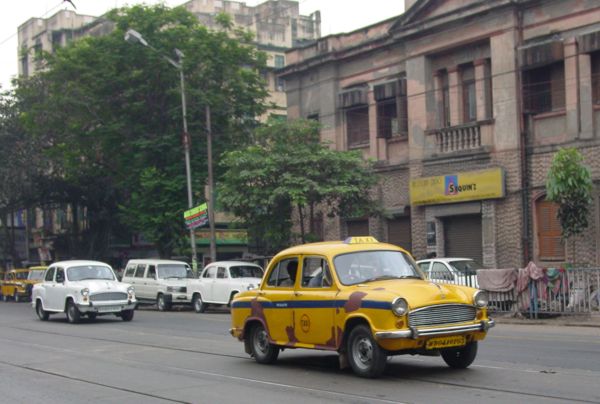 |
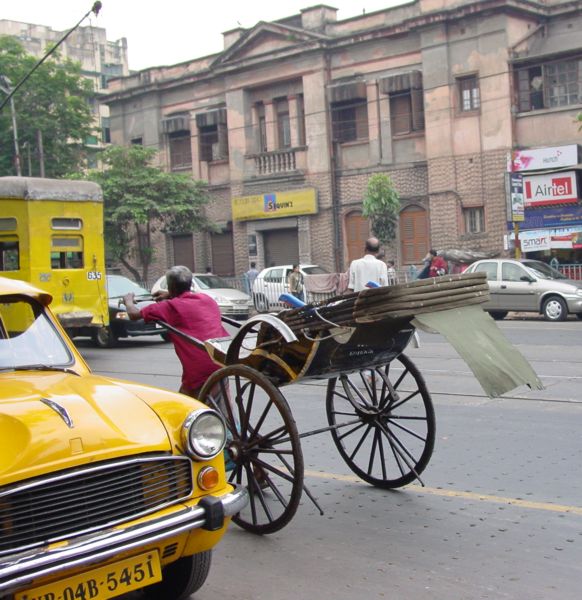 |
|||||
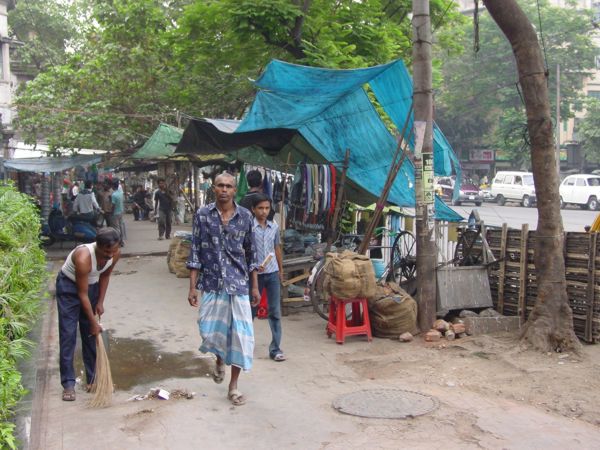 |
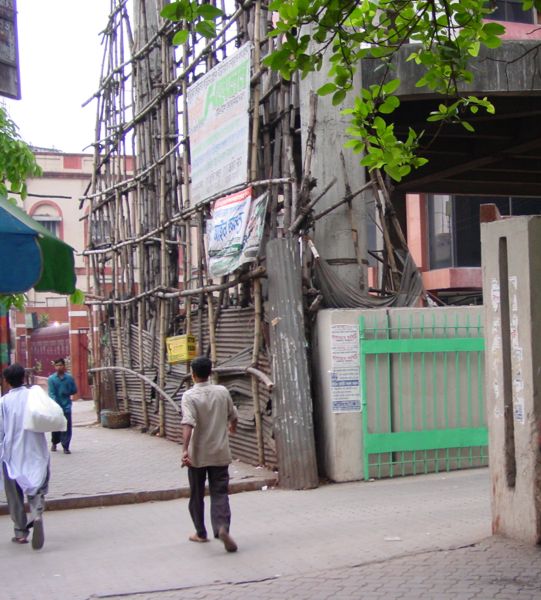 |
 |
|||||
Hyderabad had its pigeons, but in Kolkata, the municipal bird is the crow! They are everywhere. The garden of even the best hotel is filled with the cackle of the black hordes. Understandably, they are the clean-up crew for any metropolis with a garbage disposal problem. We associate them most with Kolkata (especially the infamous Rutt Deen), but even in Colombo, they buzz the pool at the Hilton, cautiously drinking from the crystal clear water when they can get away with it. Another guest warned us not to leave our glasses lying exposed on the table. The crows love anything shiny!
By far the most important thing we did in Kolkata proper (sic) is go to the MahaBodhi Book Agency. We promised our Bangladeshi novice students in Peradeniya that we would buy Dhamma books in Bengali for them. The only place in the world to get them is the MahaBodhi Book Agency on Bankim Chatterjee Street. Some time back, the Jayawaradanas undertook the job of publishing Dhamma books in Bengali. In addition to the millions of traditional Buddhists in Bangladesh, there are innumerable Buddhists in all the northeastern states of India, and they speak and read Bengali. Nevertheless, except for a handful of out-of-print books by ancient scholars, there had been nothing Buddhist translated, published, or available until this vital work began in Kolkata. (A separate posting will be an appeal from them for help in this valuable and meritorious work.)
 |
Jayadeva and his father preparing the Bengali Buddhist books in the office.
The Jayawardanas in their apartmment above the office. MahaBodhi Book Agency |
||||
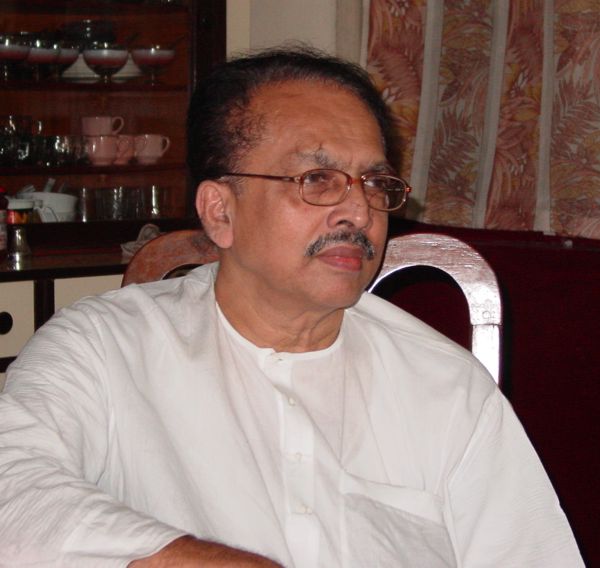 |
 |
 |
|||
During the entire stay downtown, Visakha had a cold the like of which she hadn't experienced since the old days, teaching in Japan. (It's that feeling like a knife in the back of the throat.) Ken was a little sneezy, but nothing serious, so he went exploring (read getting lost)
Ken made reservations at our deluxe luxury hotel online. It was not cheap, but considerably cheaper than any others. Also, it is nicer than the Rutt Deen, which stands out in our memories as true yuk! Ah, Thailand. Ah, Sri Lanka. Ah, southern India. Everywhere cheaper and easier than Kolkata, which is in a class by itself. While the service was OK, the room was pretty grim. It had hot water and cable, but we found ourselves marveling that the cleaners could consistently clean the sink and miss the part behind the faucet. How many years of neglect did it take for that to become so black? Viskaha had a theory about how it happened, dating from first-hand observation years ago at Mahasi Meditation Center in Rangoon. Every day she watched the Indian sweeper come in, go through the motions, and leave the women's dorm's dirt rearranged, not removed. Going through the motions of cleaning yields those sloppy results. We recalled our ESTR experience with Dorothy--teaching refugees in the PRPC how to do proper hotel cleaning--and how thorough our Cambodian and Lao students had been, polishing windows with newspaper until they shone, and sweeping up every smidgeon of dust or scrap of paper! They had shown great pride in their work.
Getting around Kolkata is by taxi, bright yellow taxis, that look quite good on the outside, but are in various states of disintegration inside, with the seat unattached, the doors not all working, the windows stuck open. Our best run was with a Sikh taxi driver. He was a brilliant driver, and he gave us a terrifying ride. "How much do we owe?" "As you like!" That alone guaranteed a smile! The one bright note of Indian cars, at least, the Ambassador, which is the most popular. The plush ceiling is gorgeous. In some, the center has a circular pattern, with ornate designs reminding one of the interior of the dome of the Paris Opera House, well, if you haven't seen the dome of the Paris Opera House for thirty years, that is.
Figuring we needed more talk time, Ken bought 500 rupees worth of Hutch cards across the street from the hotel. Then, suddenly Ken's telephone got goofy. It switched from Hutch to Airtel, a different telecom company, without warning. Then it stopped working entirely, and would not accept the Hutch cards. Visakha's phone also refused to accept the cards. Returned to the small shop where he had bought the cards and asked why and how the phone had switched to Airtel. Everyone in the shop, including the other customers, marveled and shook their heads. One customer suggested he go to a real Hutch office, and suggested there should be one near the Hindustan International Hotel, which a clerk at our hotel had suggested the night before was even closer than the famous Park Hotel, to which Ken had already hoofed. Our hero headed for the office, but could not find it. He did, however, find the hotel (actually, further than the Park) and asked the reception for the Hutch office. The clerk directed him to the manager, a very pleasant young man sitting at a desk in the lobby. He looked at Ken's phone and shook his head at disbelief at the tale. He opened it, took out the SIMM card, and declared, "It is Hutch! How can that be?!" The concierge joined us in wonderment. Then a kindly-looking gentleman with a fashionably grizzled chin stopped by. The manager put me in his care, assuring me that he could help. This gentleman was actually the manager of the bookstore, which also sold both pre-paid cards and SIMM cards for both Hutch and Airtel. He explained that a SIMM card purchased in Andhra Pradesh would not accept recharge cards from Kolkata. I should go back to Hyderabad and buy a recharge card. Out of the question. The other alternative was to buy new SIMM cards, either Hutch or Airtel. Ken asked how they were different. He tried to explain something about four-month validity with one (or both, Ken never understood). Ken tried to explain that he would only be in India for one month, but he wanted to use the phones again in October in Mumbai and Nagpur. The man made a call to inquire and then explained that a SIMM card purchased in Kolkata would not accept a recharge card from either of those cities. However, Airtel had already implemented a system, which Hutch was trying to implement, so that a user can pay an agent who will recharge the user's phone by placing a service call from his own (the agent's) cell phone. The Airtel SIMM card was 90 rupees. The Hutch card was 290. Other than that, they worked the same. Ken would have bought two Airtel cards, but the only way to use the 500 rupees of air time he had already bought was to buy another Hutch SIMM, so he bought one of each. Now we have six SIMM cards for two people, but the phones work! Every time we went into the Hotel after that, the bookman begged Ken for more identification to satisfy the phone companies--photos, copies of the passport, and proof that we were staying at the Royal Garden Hotel. A small price to pay. That wasn't a personal matter--bombs had just gone off in a Varanasi temple and train station, so suddenly everybody was a little suspect, including two unconventional foreigners who weren't staying at the Hindustan. Actually, the other day, we had a knock on our own hotel door around 8:30 at night. An immigration agent checked us out, asking where we'd come from, what we were doing in Kolkata, and how long we intended to stay. Apparently everybody was satisfied because we haven't had the feeling we were being watched (any more than usual).
We recalled frustration and failure using the internet in Kolkata in years past. At the Hindustan, we tried unsuccessfully in the lobby, so the business centre rep suggested we try the coffee shop, which seemed to be closer to the wireless connection, and it worked. Phoning around, we were offered a good deal at the Park Hotel; internet in the lobby at 250 rupees per hour or 12 hours for 600! No contest there! So far, we've used up ten hours worth of WI-FI cards. The first day we sat in the inner lobby and froze. It wasn't quite snowing, but almost. The next time, we stayed in some easy chairs near the door, surfed, and wrote e-mails to our hearts' content. For a break, we went upstairs to Atrium Cafe, which has an orange color scheme and delicious cappuccino. We recalled meeting Bruce there before embarking on our pilgrimage together in2001-02.
There seem to be not as many beggars as in past years, but the tiny children; gaunt, hollow-eyed men; and leprous women still ply the spaces between traffic at stop lights. Once, we were offered ten beautiful red roses for a reasonable price. Not needing the flowers, we demurred, but who could refuse a cute little stuffed white rabbit, obviously handmade, slightly smudged, but with perky ears--for only ten rupees?
We have no way of testing, but we'd be willing to bet that the Kolkata water is no cleaner than it used to be. No rain since the relatively light monsoonal rains. Usually there is rain in early January, but this year has brought nothing, so the rivers are drying up. Kolkata Port may be shutting down soon as the level of the Ganga has reached an all-time low, due to the paucity of rain in the Gangetic plains. The port is so shallow that on and off loading is endangered. January to May are always dry months, but this is the most extreme drought yet, and the water sharing agreement with Bangladesh is in jeopardy. Wherever we can see one, we're stuck by how parched and dusty the trees appear, and the papers are full of stories of farmers killing themselves from hopelessness. (On top of that, one farmer in West Bengal just killed himself by drinking pesticide because his poultry business collapsed due to bird flu!)
While poverty may be eased somewhat, there was a story in the papers about a 78-year-old woman from a middle-class family being abandoned in a local Kolkata train station to fend for herself. Her brother and his wife expected that she'd get on a train and go away somewhere. Depressed by their callousness, however, and incapacitated by recently broken legs, she stayed in the station, sheltering in a corner. Her situation was noticed, but when volunteers contacted her family, who incidentally live in a good neighborhood in a huge, 11-room house, they were told to forget it! They didn't want her back. "We have no money to spend on her. We have to arrange for our daughter's marriage." The ailing elderly lady refused food, and seemed resigned to die, while volunteers scrambled to help.
Moldering buildings--those that are new stand out in sharp contrast, they are clean, white, and look good. The others are unbelievable, decaying, decrepit, and creepy, Shops below are grim, dark, and dirty. Apartments or whatever is above are hidden behind dark windows or rusted shutters.
On the sidewalks--people sleep, live, set up shop, prepare food, cook, care for babies, and, of course, relieve themselves, although not as obviously as one would expect.
We survived Holi, a Hindu holiday with origins in a fantastical story of the destruction of a female demon by the baby Krishna who burns her to a crisp. To celebrate, people play with colors (bright dyes, which used to be homemade from flowers and stuff, but are now chemical and often from China!) Some people throw handfuls of these colors, other folks rub them onto other people's faces. Sometimes the powdered dyes are mixed with water and poured by the bucket full or shot from waterguns. We saw a warning on the news on how to prevent injury: make sure that you use only the proper kind of dye, and, if you are showered, don't rub your eyes, etc. We saw shops set up along the street selling the squirt tubes, but we were glad to lay low in our hotel until the afternoon, when we retreated to the temple, passing troops of youths, with multicolored faces and bright punkish hair, and clothes streaked with colors. Frankly the entire holiday was not our cup of tea. We didn't have the Holi spirit, so to speak!